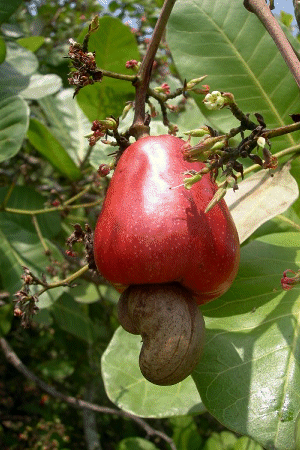


IMPORTANT: The information provided is for information only. The medical claims or advice are not endorsed. Never take any medicines without first consulting a qualified practitioner.

In the Caribbean islands, people eat both the tasty nuts and the 'apple' (or 'banana'), the fleshy structure from which the nut hangs. This is used to make a refreshing drink, wine, brandy and jelly. Its acid, aromatic juice contains five times as much vitamin C as orange juice.
Cashew are very tasty, but they must be roasted before eating, as the thin shell contains a very irritant oil. The active chemicals are cardol and anacardic acid. Roasting gets rid of the oil, but the fumes that arise during roasting can cause skin and eye irritation, inflammation and poisoning.
Every part of the plant appears to have medicinal uses. Jamaican herbalists agree with Sloane that leaf extracts can be used to bathe ulcers or added to baths for fever.
One cold remedy involves a mix of cashew leaves, fern leaves and 'rat ears', wrapped in cashew leaves and then boiled.
An infusion of leaves and bark is used for dysentery, toothache and sore gums.
In the tree's native country, Brazil, bark teas are used for diarrhoea, and the caustic shell oil for skin infections, warts, worms and botfly larvae beneath the skin.
In Africa, the young leaves are used to treat dysentery, diarrhoea and piles.
The delicious kidney-shaped nut is actually a fruit. It hangs from a large fleshy structure, called the cashew 'apple'. This is bright red, orange or yellow in color.
Resins and gums from the bark and stems (cacajou gum) are used in varnishes for books, wood and flooring, to protect from ants and other home-invading insects. The sap is said to have insecticidal properties.
The shell oil is used in industry to make plastics and resins. Cashew-nutshell liquid (CNSL) is also used in brake linings and clutches.
Cashew oil and juice are added to facial peels, scalp conditioners and shampoos.
Extracts from cashew apple and bark are reported to act against bacteria that cause some stomach ulcers. The bark and leaves are both rich in tannins and have anti-inflammatory and astringent properties. Leaf extracts have been shown to be useful against lab-induced diabetes. Nutshells have acids toxic to certain cancers.